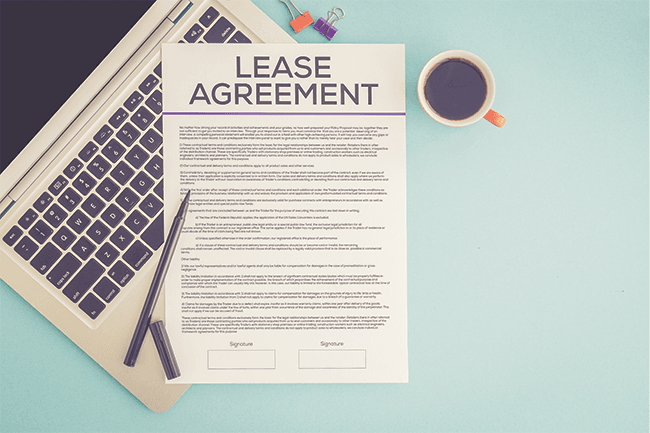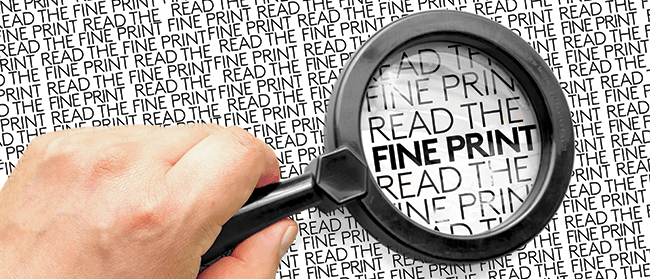
You leased your copier and you are getting close to the end of your agreement. What happens at the end of your agreement? Are there next steps that need to be considered?
As one of the largest copier dealers in the southeastern United States, we get asked these questions all the time. This article provides answers, breaks down the different types of multifunction copier leases, and will hopefully give you the knowledge necessary to feel confident at the end of your lease.
Not a lot of time? Skip to what you need:
Not All Leases Are Created Equal
What Are the Different Types of Leases?
Not All Leases Are Created Equal
There are essentially three types of leases with a fourth, refinancing option. But before we break down the different types, it's important to note that the information contained in your lease and service agreement will dictate what you can and/or should do.
Before you read any further, take a look at your contract language and make sure you clearly understand your cancellation policy (assuming you want to discontinue payments). In many cases, service agreements can rollover another 12 months if you don't notify your leasing or service provider in writing, in advance.
The details of how early or late you can send notification will be within that contract, as well, but many dealers will request written notification no earlier than 90 days, but no later than 60 days prior to the end of the agreement.
RELATED: How Do I Get Out of My Copier Lease?
What Are the Different Types of Copier Leases?
There are three types of leases you can agree to when purchasing/renting a copier:
Dollar Buyout
The dollar buyout is the option you should stay away from the most as a customer. It is the best for the vendor and the worst option for you.
Why is that?
A dollar buyout simply means that at the end of your lease, it costs you one dollar to own the machine. That sounds great on the surface, but there are a couple reasons why it isn't as great as it sounds:
- The rate for the lease is much more expensive and purchasing the machine outright would be a much more financially savvy investment.
- As a consequence of how the lease is structured, you can't write-off the purchase the same way you can by simply purchasing the machine outright.
Ultimately, you end up paying more money for a machine that is now obsolete and is four or five years old. Most companies choose an option that allows them to upgrade at the end of their lease, so that their technology can remain current and reliable.
Fair Market Value
Fair market value is a popular option because at the end of the lease, you get a new machine. This is a similar concept to that of trading in your vehicle for a new one.
The dealer will assess the value of the used equipment you have been making lease payments on, and offer money off your new equipment. The end result is often a cheaper monthly payment for better equipment.
I know what you're thinking: "So, I can trade in my old equipment and get new equipment for cheaper? That doesn't make any sense!"
You're correct - - it doesn't make any sense if we are comparing apples to apples. Where your savings occur is in your service contract. Simply put, new machines breakdown less often, so dealers will charge you less for service because you are costing them less to service your machine; yes, your service price may incrementally climb as your machine advances in years.
The actual cost of the new machine will be more or equally expensive, but the service will be cheaper, thus making your overall cost cheaper.
No Purchase Option
A no-purchase is exactly what it sounds like. You entered into the lease with no desire to purchase the machine at the end. Essentially, a no-purchase option is a rental.
At the end of your contract, you will either return the machine or continue to rent it from the dealer or manufacturer. This option can be favorable to organizations who have no interest in owning their machine, but it's not recommended to continue renting a machine long term.
Like many contracts, service costs will rise as your machine gets older, making a rental option less affordable, long term.
Other Options
Refinancing
During and now after the pandemic, many homeowners turned to refinancing as a way to stave off rising expenses when money became tighter. Refinancing, however, isn't just an attractive idea for homeowners.
Businesses are negotiating renewed leases on older equipment with copier dealers, as well. This is more typical on a three-year lease or by the third year of a five-year contract.
The benefits of this option can be a reduced monthly payment, and because of the nature new leases, organizations can effectively "skip" a payment from the time of the old lease to the beginning of the new one (just like refinancing a home).
In-House Leasing
Not every copier dealer can offer this, but make sure to check with the dealer you wish to do business with on whether they are able to finance your copier purchase in-house.
Our company, Standard Office Systems, has a financing division called SOS Capital. This serves as the in-house financing division of our company and affords customers flexible lease options.
This becomes particularly advantageous when an organization has difficulty being approved for a lease by a traditional leasing company, and offers the luxury of having one point of contact between you and the entirety of your copier purchase.
Be Prepared

Now that you understand the different types of leases, it's important to look at your leasing agreement and determine which type of lease you have.
Remember, pay particular attention to the wording as many agreements are purposefully ambiguous in an attempt to confuse the customer, ultimately resulting in additional billed months beyond the original agreement (often at a higher rate).
Pay attention to things embedded into the agreement like:
- Requests to end the agreement in writing (or certified mail)
- 30 days prior notice, but
- not more than 90 days prior notice
- Any special buyouts to conclude the agreement or other steps that may not be obvious
Ultimately, try to build a relationship between you and your dealer representative before entering into an agreement. You may get a quick sense as to who is trying to genuinely help your organization and who is trying to make a quick buck any way they can.
By asking questions and being aware of the details of your contract/agreement, you can be prepared for the end of your copier lease, without any unwanted surprises.
Have more questions? Reach out to us!
Posted by Bernie Schom

Bernie Schom is the Vice President of Sales at Standard Office Systems and has been in the copier and printer industry for over three decades.

